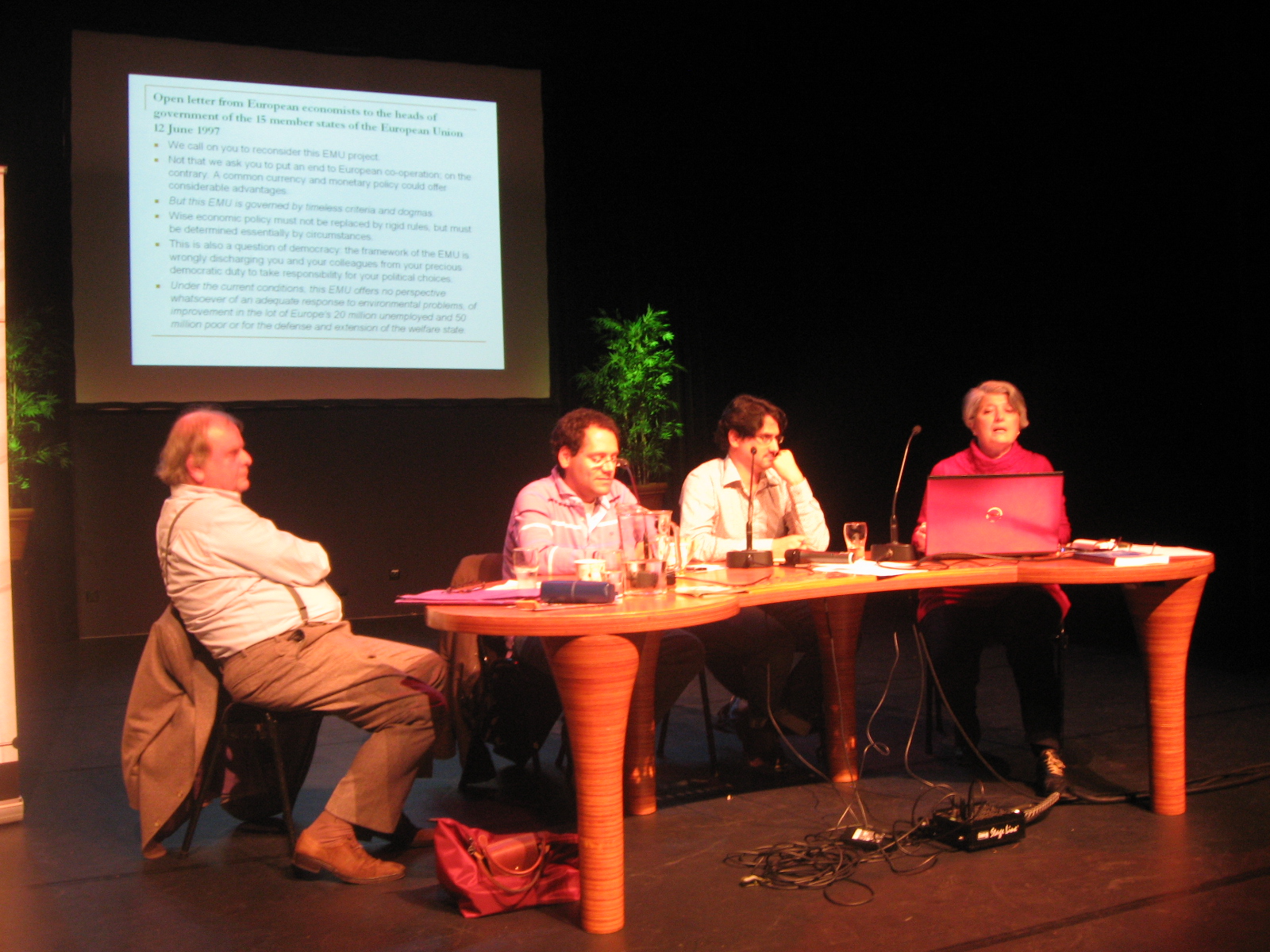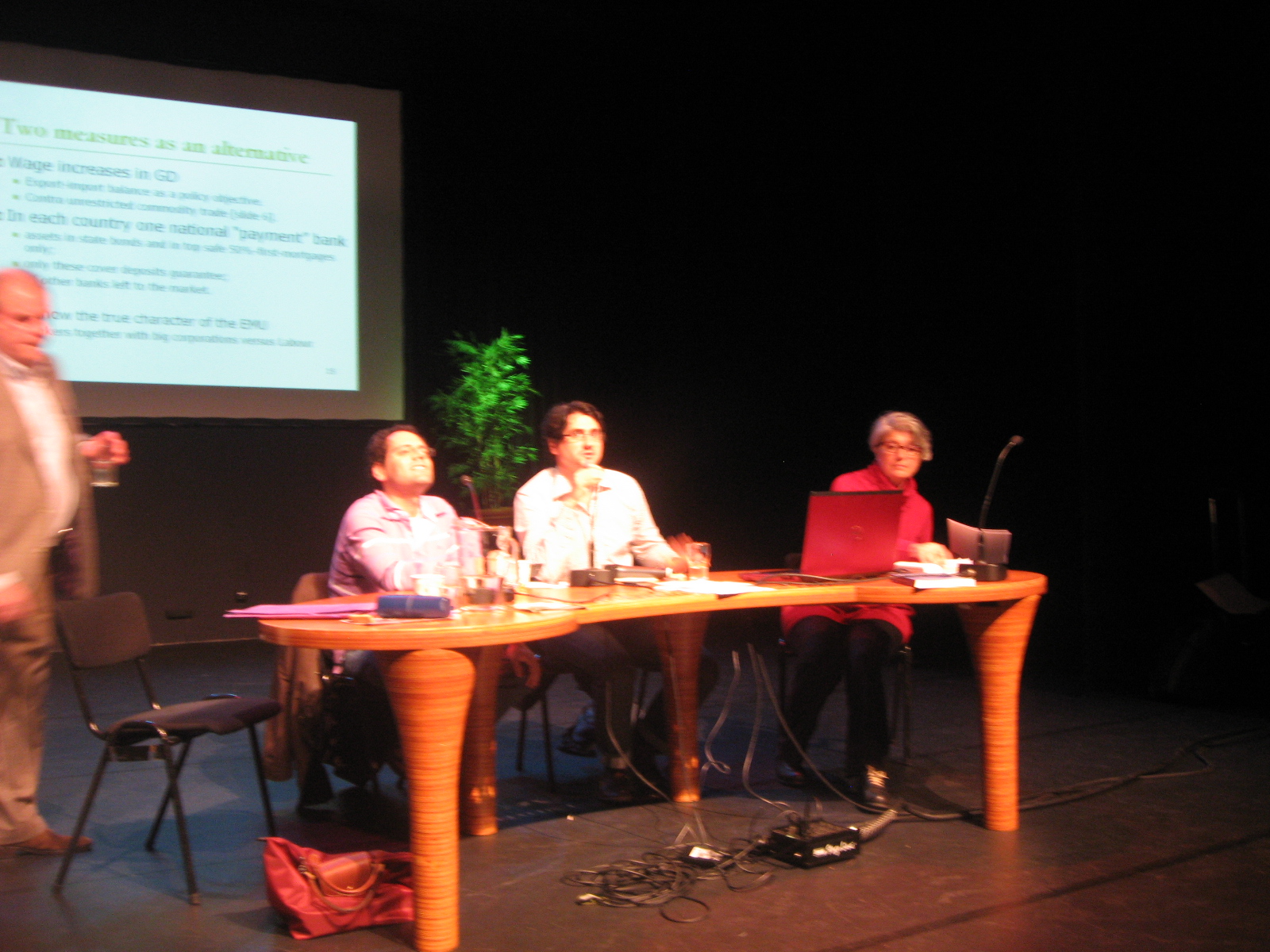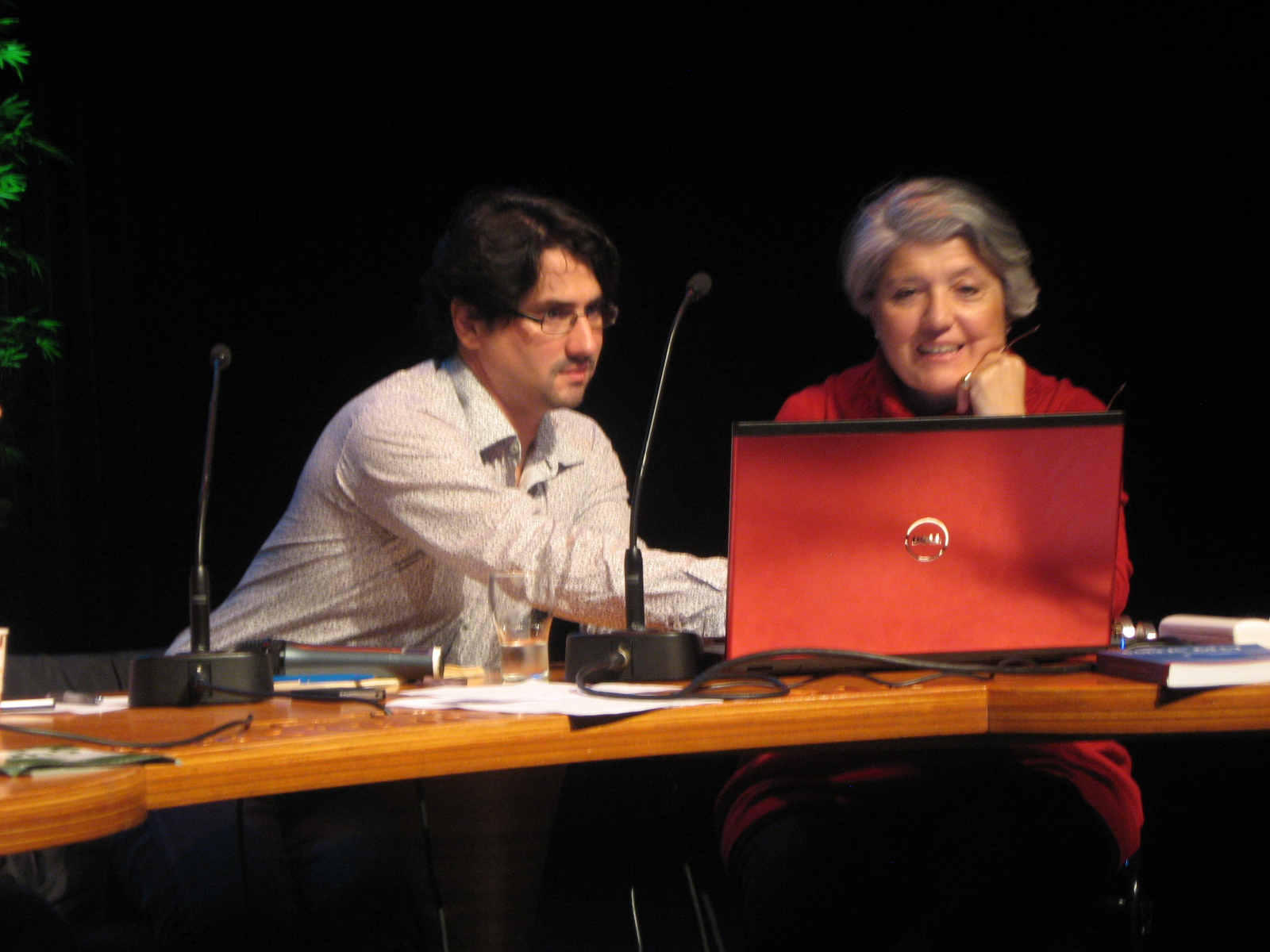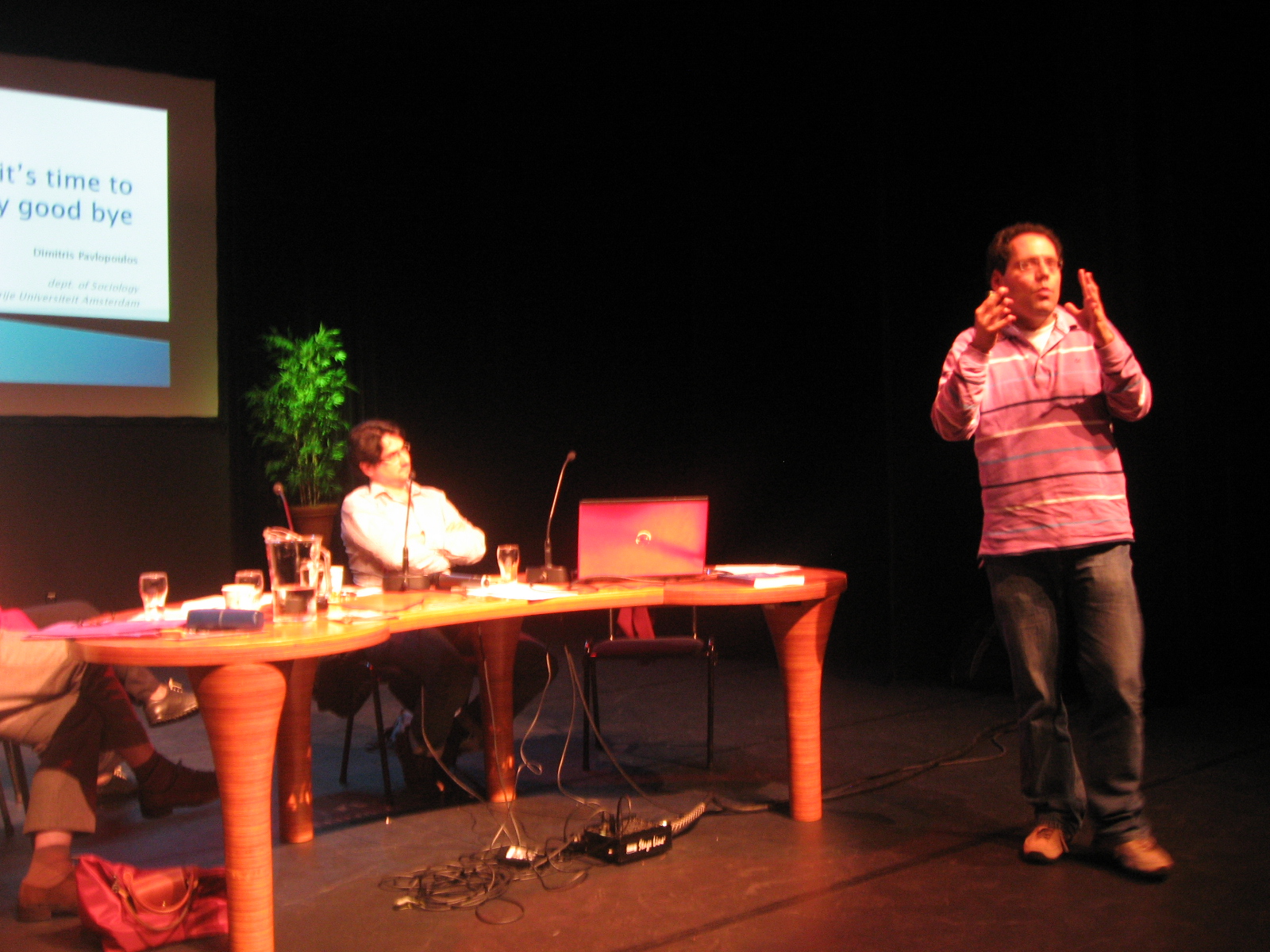Report CREA 22/10 To Euro or not to Euro
On October 22 the Real World Economics program in CREA was about the current Euro-crisis, and the perspective of Greece. Below are links to the slides presented at that event, and some pictures and a quick sketch.
Een verslag van het Real World Economics-programma van 22 oktober, over ‘Wel of geen Euro’? (In het Engels)

Moderated by Rodrigo Fernandez, there were three experienced guests, who each held a 20 minutes introduction.
 First to speak was Geert Reuten, economist at UvA and Senator for the leftist party SP (slides Geert Reuten). Geert was also one of the more than 70 economists behind a manifesto against the introduction of the Euro in 1997 (see the international version here). In that declaration they warned against exactly the effects that we see now. Geert Reuten started by focusing on the current political events at the EU. Things are moving very fast there. The process goes into the formation of a Banking Union, where democratic procedures are a mere footnote. Typical is also the latest report Van Rompuy issued, with the remarkable title “Towards a genuine Economic and Monetary Union”, leaving us with the notion that up till now we have been living in a not genuine union…
First to speak was Geert Reuten, economist at UvA and Senator for the leftist party SP (slides Geert Reuten). Geert was also one of the more than 70 economists behind a manifesto against the introduction of the Euro in 1997 (see the international version here). In that declaration they warned against exactly the effects that we see now. Geert Reuten started by focusing on the current political events at the EU. Things are moving very fast there. The process goes into the formation of a Banking Union, where democratic procedures are a mere footnote. Typical is also the latest report Van Rompuy issued, with the remarkable title “Towards a genuine Economic and Monetary Union”, leaving us with the notion that up till now we have been living in a not genuine union…
The EU is falling apart now in those in favor of the EMU and the rest, and this also raises questions about the future of the European Parliament.
In a short retrospective on the manifesto of 1997, Geert pointed out the main points raised. One of the main issues the economists explained was that this would benefit the economies inside the Eurozone with a (trade)surplus, and that is exactly what happened, and part of what caused the situation that countries like Greece and Spain and Portugal are in today. They knew beforehand that since individual countries wouldn’t be able to compete with national currencies, they would be forced to compete on other costs (mainly being: labor, environment and taxation).
Geert described a division of Europe into ‘Greater Germany’ (with countries like Finland, Netherlands…) and ‘Greater Greece’, and the latter are the ones that miss out. The Netherlands for instance still gains two billion (twee miljard) a year form Greece. Graphs on slide show the division, that did not diminish in the 15 years the Euro exists. As a solution Geert comes with two practical measures: increase wages in ‘Greater Germany’, and erect a National Payment Bank in each EU member state.
 Second to speak was Marica Frangakis, she is an economist and works for the Nikos Poulantzas Foundation and is member of Attac and the Euromemorandum group. She came all the way from Greece especially for this event (thanks to TNI). Her most recent book that she co-authored deals with the policy of privatization in the EU and the very negative effects that this has mostly had.
Second to speak was Marica Frangakis, she is an economist and works for the Nikos Poulantzas Foundation and is member of Attac and the Euromemorandum group. She came all the way from Greece especially for this event (thanks to TNI). Her most recent book that she co-authored deals with the policy of privatization in the EU and the very negative effects that this has mostly had.
Frangakis also sketched (Slides Marica Frangakis) the beginning of the European Monetary adventure (“a very sad story”) comprising now economies that have a 12 point difference in gdp-growth figures and often little political similarity. Frangakis points at a second manifesto that was also issued in 1997, by the Euromemorandum group and where they warn against the great risks for “welfare, justice, and the European Union”. The austerity and structural reforms that the EU now promotes, are dogma’s without any positive effect as perspective. They create incredible damage to the Greek society, as is illustrated with some mind-blowing statistics
With Geert, and later Dimitris, Marica point at the role that financial deregulation has played in creating this crisis, as it enlarged the imbalance between core and non-core EU-countries. Frangakis ends with a list of measures that should be taken, reinstating public services, stopping austerity en reforming the ECB. She also mentioned the validity of a Debt Audit Campaign, (an emerging issue that we will focus on later in our RWE program series).
 Third and last speaker was Dimitris Pavlopoulos, economist at VU and also member of the Real World Economics group. In his introduction he debunked the mainstream myths about the causes of the crisis in Greece (such as the lies that gets repeated in newspapers like De Telegraaf that Greek people are lazy, don’t pay taxes etc). The real reasons are the way the EMU has been developed, and also the labor market policies. Again. all three speakers pointed this out, what happened in the past 15 years is that countries in the south (of the EU) massively imported financial capital from the north. People in the south were promised financial stability and prosperity, but what they got instead was instability and misery. Also telling was the graph that Dimitris showed how taxation changed: individuals pay twice the amount they payed in 2001, while corporations saw their share halved. (Slides Dimitris Pavlopoulos)
Third and last speaker was Dimitris Pavlopoulos, economist at VU and also member of the Real World Economics group. In his introduction he debunked the mainstream myths about the causes of the crisis in Greece (such as the lies that gets repeated in newspapers like De Telegraaf that Greek people are lazy, don’t pay taxes etc). The real reasons are the way the EMU has been developed, and also the labor market policies. Again. all three speakers pointed this out, what happened in the past 15 years is that countries in the south (of the EU) massively imported financial capital from the north. People in the south were promised financial stability and prosperity, but what they got instead was instability and misery. Also telling was the graph that Dimitris showed how taxation changed: individuals pay twice the amount they payed in 2001, while corporations saw their share halved. (Slides Dimitris Pavlopoulos)
As solutions Dimitris comes with the provocative suggestion to leave the Euro (first Greece, but probably that would cause such a commotion that more countries would start dumping the project). And all three agreed that a debt write off and regaining control over the financial sector are pressing measures to take.
After the introduction three rounds of questions and answers followed. Mostly about details of the introductions, but also more political debate, such as on the perspective of a Grexit, and the consequences thereof. All kind of solutions passed along, including the Montenengro strategy (keep the money but kick out the ECB). We did not have time to go into the next step in this debate: what should social movements do? We will organize a follow up on this subject later in the program. Marica Frangakis ended with a quite worrying prediction that Greeces default might start pretty soon and would have quite far reaching consequences. The present government might not be in power much longer, as there is no way they will survive the proposal of more austerity measures. That would mean new elections, which Syriza will most probably win, and they might decide to (or be forced to) step out of the Euro. This on its turn could cause an unprecedented domino effect, bringing the whole EMU-project in jeopardy. This could already start happening in a few months time…
So keep informed, and organise to be able to act, because interesting times lie ahead. Real World Economics will do its best to help provide usefull information.
———-
By the way: we heard that someone got angry at the entrance for having to pay 5 euro to assist the event. It is part of the deal we have with CREA, and all students have free access. But the rest has to pay the entrance fee. If the five euro is a problem and you let us know beforehand, for instance if you have been working on doing publicity for the program or something, we can often help you out. And also we organise or assist on demand at other events that often are freely accessible (and we don’t get any income out of this, but CREA has to pay their expenses somehow, especially since the UvA had lost heavily gambling with derivatives…)